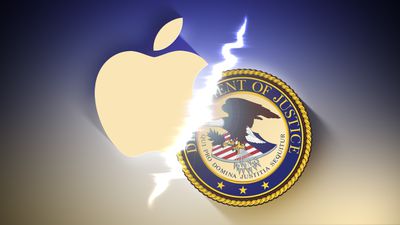Apple today filed a response to the antitrust lawsuit it is facing from the United States Department of Justice, sharing rebuttals to the DoJ's claims and pointing out perceived flaws in the accusations outlined in the complaint.

According to Apple, the DoJ's lawsuit has the potential to "set a dangerous precedent" that would allow the government to dictate the design and function of technology, plus it threatens "the very principles that set the iPhone apart" from competing devices.
As a recap, the DoJ filed an antitrust lawsuit against Apple in March 2024, accusing Apple of an illegal monopoly in the smartphone market. To back up its accusation, the DOJ provided five examples of instances where Apple's decisions stifled competition and locked consumers into the iPhone ecosystem.
- Super apps - The DoJ claims that Apple blocks apps that offer "broad functionality," like WeChat or apps that offer mini games and other multi-app features.
- Cloud streaming - Apple has been accused of suppressing cloud streaming games by preventing them from being available on the App Store.
- Messaging apps - The DoJ took issue with the lack of an iMessage app for Android, the green bubble vs. blue bubble separation, and Apple's delayed support for RCS. The DoJ also believes that third-party apps should be able to send and receive SMS messages in lieu of the Messages app.
- Smartwatches - Apple is accused of restricting key functions from third-party smartwatches, preventing iPhone users from getting Apple Watch-like functionality from watches with "better user interfaces and services." The DoJ has also complained about the Apple Watch not being compatible with Android devices.
- Digital Wallets - The DoJ took issue with Apple's refusal to allow banking apps and other digital payment providers to access the NFC chip in the iPhone for payment purposes.
Many of the DoJ's claims have been weakened or are no longer relevant, because Apple has addressed them. With iOS 17.4, for example, Apple eliminated restrictions on cloud streaming apps and apps offering mini games on iOS, and super apps are and have been supported.
Apple adopted RCS since the DoJ's filing, improving messaging interoperability between Android and iPhone devices, though messaging apps cannot receive SMS or RCS messages instead of the Messages app. Apple opened up access to NFC in iOS 18.1, adding support for contactless NFC payments through third-party payment apps.
Apple does not believe that the DoJ fairly portrayed Apple's market position. The DoJ uses revenue as its metric for calculating market share instead of unit sales, which Apple says is "unreasonable." The DoJ also suggested that "performance smartphones" are a separate category from standard smartphones, even though that is not a recognized device category. Apple also argues that the U.S. numbers are not an accurate reflection of the global competition that it faces.
Apple points out that the complaints that led to the Department of Justice's lawsuit did not come from iPhone customers, but rather from a small number of developers that happen to include "some of Apple's largest and best-funded competitors." Apple claims that meeting the DoJ's demands would degrade the iPhone experience for consumers.
The antitrust laws do not impose upon Apple a duty to design its own product in a way that would better suit its rivals at the expense of consumers whose devices might be less secure, less private, and less intuitive as a result.
Ultimately this case is not about the millions of satisfied iPhone users or even the hundreds of thousands of iOS developers that enjoy economic success, it's predominantly about a few large companies free-riding on Apple's technology and innovation. The complaint is a misguided plea for a judicial redesign of one of the most popular and innovative consumer products of all time, under the guise of an antitrust case.
Much of Apple's response features Apple denying the DoJ's claims, one by one, which is standard for this type of filing. The legal dispute will now enter the discovery phase, with Apple aiming to prove that the DoJ's allegations are inaccurate. From there, a summary judgment will be handed down, which could lead to a trial and appeals. The entire process will span years.
The App Store ecosystem is changing rapidly enough that the DoJ's claims may not be applicable at all in the future. In the last year, Apple changed multiple App Store rules, both voluntarily and involuntarily. Apple's legal dispute with Epic Games, for example, resulted in Apple permitting developers to direct customers to third-party purchase options on the web with in-app links and no associated fees. Similar changes could further nullify the DoJ's allegations, so it should be interesting to see how the dispute plays out.







 ('https://www.macrumors.com/2025/07/29/apple-doj-lawsuit-response/')
('https://www.macrumors.com/2025/07/29/apple-doj-lawsuit-response/')











